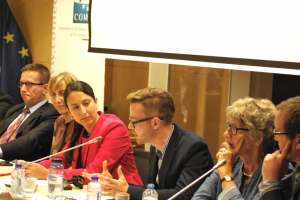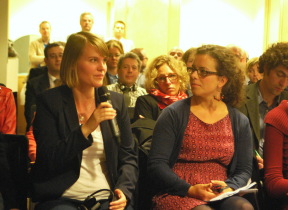 On the evening of the 9th of September 2014, around 100 people from different institutional, national and religious backgrounds gathered in the premises of Commission of the Bishop’s Conferences of the European Community (COMECE) in Brussels for an evening debate “Young Europeans: We stand for sustainability and eco-justice!”. The event was organised in collaboration of seven organisations – Secretariat of COMECE, The Church and Society Commission of CEC, Don Bosco International, Ecumenical Youth Council in Europe, Evangelical Church in Germany The Federation of Protestant Youth in Germany and Rete Juventutis – creating a unique ecumenical setting.
On the evening of the 9th of September 2014, around 100 people from different institutional, national and religious backgrounds gathered in the premises of Commission of the Bishop’s Conferences of the European Community (COMECE) in Brussels for an evening debate “Young Europeans: We stand for sustainability and eco-justice!”. The event was organised in collaboration of seven organisations – Secretariat of COMECE, The Church and Society Commission of CEC, Don Bosco International, Ecumenical Youth Council in Europe, Evangelical Church in Germany The Federation of Protestant Youth in Germany and Rete Juventutis – creating a unique ecumenical setting.
The evening debate was an opportunity to show the passion, involvement and experience of the young people regarding the issues of sustainability, ecological justice and changes that can be made by more awareness and personal change. It also provided an opportunity to meet the European decision makers, responsible for policy developments and international negotiations regarding climate issues, which offered a solid background information regarding the initiatives done by the European Union towards environment.
The evening started by an opening speech by Fr. Patrick Daly, the General Secretary of COMECE, who described the relationship we have with the natural world, being part of the creation and and the proceeded to explain that everyone of conscious can own to climate changes.
To open the debate with good practice examples, two projects addressing sustainability were presented. Four young people from the Evangelical Lutheran Church of North Germany presented a project “Klar zur Wende” in the framework the Youth Climate Conference. The project entails giving young people the opportunity to express their concerns and demands regarding the climate issues during a weekend activity. To achieve this goal, the young people took part in different workshops, e.g. building a windmill to charge the battery of a phone or practical vegan cooking classes. In addition, discussions with science experts took place to help them understand the mechanisms behind global warming, as well as a song contest was organised around themes of ecology and environment. At the end of the weekend, young participants were ready to express their 19 demands towards the church. The demands included the creation of a climate network for young people, giving a deadline to local church to reduce the amount of energy used and to start using new forms of energy, investing in consumption of locally produced products.
 Mr. Igino Zanandrea, representative of Turismo Giovanile e Sociale in Italy presented a project focusing on sustainable tourism, which is connected to Salesians of Don Bosco. This project offers young people the opportunity to discover the world through sustainable tourism, e.g. hikes in local forest to promote preservation of nature, excursions to different cities to discover their hidden treasures and local traditions instead of mainstream tourist places, as well as a Venice street fountain route to promote use of refillable bottles instead of disposable. In addition, the tourism can be used as a social and educational experience to teach people and make them aware and respectful of the world.
Mr. Igino Zanandrea, representative of Turismo Giovanile e Sociale in Italy presented a project focusing on sustainable tourism, which is connected to Salesians of Don Bosco. This project offers young people the opportunity to discover the world through sustainable tourism, e.g. hikes in local forest to promote preservation of nature, excursions to different cities to discover their hidden treasures and local traditions instead of mainstream tourist places, as well as a Venice street fountain route to promote use of refillable bottles instead of disposable. In addition, the tourism can be used as a social and educational experience to teach people and make them aware and respectful of the world.
Mrs. Roberta Di Lecce, the Climate Change Attaché at the Permanent Representation of Italy to the European Union, in her keynote speech strongly highlighted the considerations of costs in the climate change and sustainability debates. On contrary to the popular beliefs, sustainability does not cost more in the long run. Quite opposite, in long term it prevents costs caused by extreme climate conditions, such as floods, it helps creating jobs that cannot be de-localised as they concern maintenance of area, it supports the idea of circular economy where the resources are used wisely. In addition, she explained the current initiatives and vision of the Italian Presidency’s in the framework of the EU-climate talks and sustainability, as well as gave insight into developments around the international climate negotiations.
During the panel discussion Mrs. Margrete Auken MEP, Member of the Committee on the Environment, Public Health and Food Safety, Mr. Yrjö Mäkelä, Deputy Head of Unit, International and Inter-institutional relations, DG Climate, European Comission, Mr. Raphael Breyer of the Federation of German Catholic Youth, Rev. Peter Pavlovic, Study Secretary of the Church and Society Comission of CEC, Mr. Pawel Pustelnik, member of the CCT of EYCE’s Campaign to Promote Ecological Justice and Mrs. Roberta Di Lecce provided their insights on the current issues of sustainability and eco-justice in EU and globally. The main points highlighted during the discussion were the notion that we cannot afford not to care about sustainability and eco-justice as the time is critical, therefore the different actors in society should contribute, not only governments, but also civil society and individuals with a personal change of lifestyle. Special attention should be given to youth and allowing sufficient space for young people to contribute to the ongoing debates and negotiations, as often young people are invited as a quota, not as substantial contributors.
 EYCE representative Mr. Pawel Pustelnik noted that “Over the 3 years of the campaign we have learned that the ecumenical youth is enthusiastic about eco-justice initiatives, however they need to be provided with space and tools to fully participate in the eco-discourse. Otherwise their energy can easily be wasted.”
EYCE representative Mr. Pawel Pustelnik noted that “Over the 3 years of the campaign we have learned that the ecumenical youth is enthusiastic about eco-justice initiatives, however they need to be provided with space and tools to fully participate in the eco-discourse. Otherwise their energy can easily be wasted.”
EYCE hopes that there will be good possibilities for participation and contribution from the side of young Christians and together we will mitigate the negative effects of our activity in trade, industry, consumption and way of life! It can be done in many ways – by actively participating in political processes, as well as by reconsidering one’s own habits, as Fr. Patrick Daly pointed out in his closing remarks, saying that the small changes are the easiest ones and we can start by drinking tap water, going on hikes and seeing nature, as well as allowing more time for interaction with other people.
Let us be Eco-heroes on all levels – individual, social and political!
EYCE warmly thanks all the partners for the fruitful and enriching cooperation!
